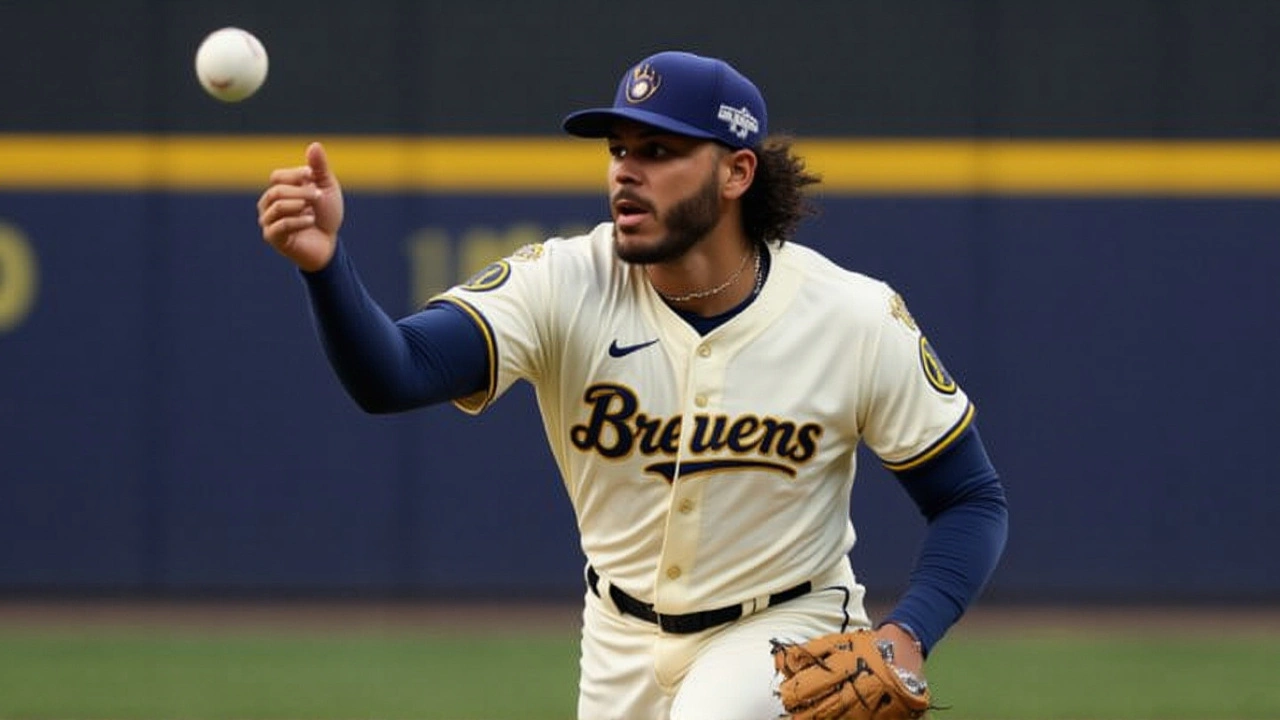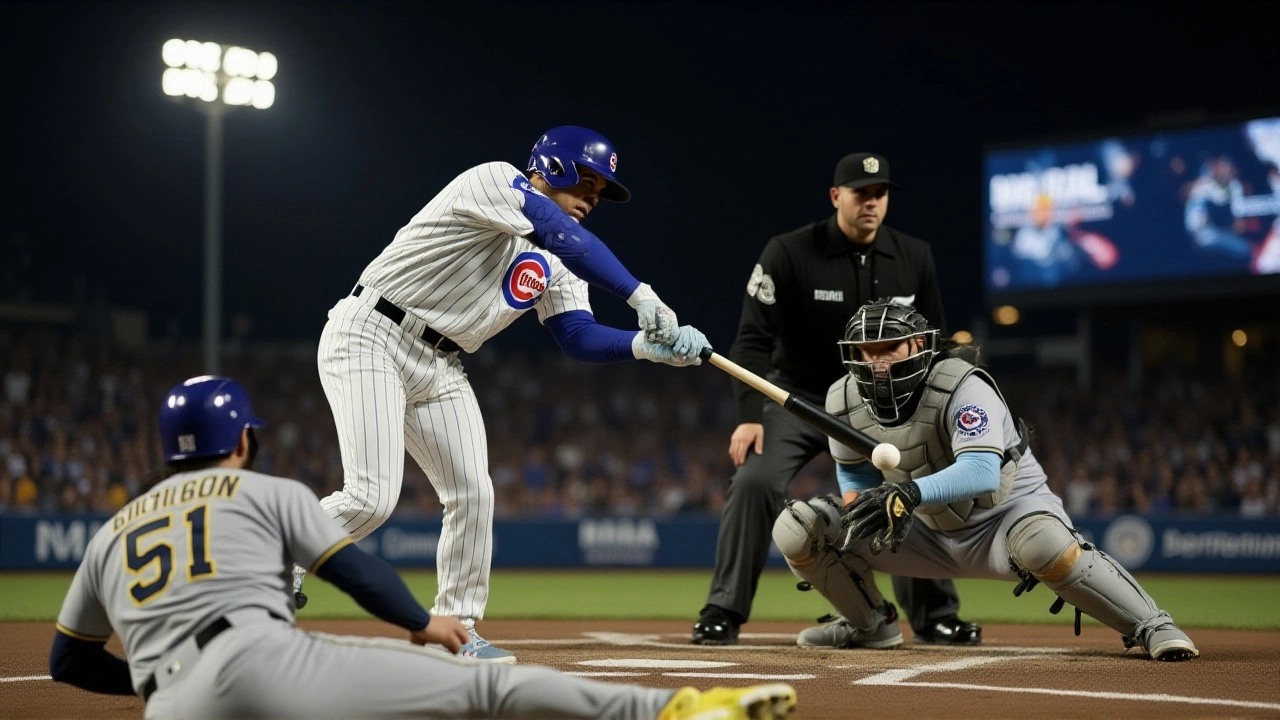When Yoshinobu Yamamoto, starting pitcher for Los Angeles Dodgers delivered a complete game on Tuesday, October 14, 2025, the Milwaukee Brewers were left with nothing but a quiet clubhouse and a 2‑0 series deficit. The win came at American Family Field in Milwaukee, Wisconsin, and it marked the first time since the 2010 San Francisco Giants that a postseason series featured back‑to‑back starts of eight innings or more from the same team.
- Final score: Dodgers 2, Brewers 0
- Winning pitcher: Yoshinobu Yamamoto (complete game, 8 IP, 0 ER)
- Key hits: Solo homers by Max Muncy and Teoscar Hernández
- Attendance: 43,793 fans
- Series lead: Dodgers up 2‑0
Series Overview and Game 2 Recap
The NLCS opened on Monday, Oct. 13, with another tight pitching duel – Blake Snell, the Dodgers’ left‑hander, threw eight shutout innings, and the Brewers fell 2‑1. By the time Game 2 rolled around, the Brewers were already feeling the pressure of a 0‑2 hole on home turf.
Yamamoto turned in a masterclass, scattering six hits and striking out ten batters while never allowing a baserunner to reach third. The only scoring came in the fourth inning when Max Muncy belted a solo shot to left‑center, followed three innings later by a two‑run blast from Teoscar Hernández. Both homers were off‑balance, but they proved enough; the Brewers couldn’t string together a single run in 2 hours 47 minutes of baseball.
Pitching Duel: Yamamoto vs. Brewers
Yamamoto’s line — 8 IP, 0 ER, 4 H, 10 K, 2 BB — was a textbook example of how a dominant arm can shut down any offense. The Japanese right‑hander’s fastball sat in the mid‑90s, while his splitter dropped like a stone, baffling Milwaukee’s hitters. The Brewers countered with a five‑pitch mix from their starter, but none of it stuck. By the fifth inning, every time a Brewers runner reached base, Yamamoto cracked a ground ball or induced a weak fly that stayed in the park.
It’s worth noting that Yamamoto’s complete game is the first of its kind in a NLCS since Tim Lincecum threw a complete game for the Giants in 2010. The back‑to‑back eight‑plus inning starts (Snell and Yamamoto) have only happened twice in a single postseason series in the last 15 years, underscoring just how rare this level of pitching dominance is.
Key Offensive Moments
Against a pitching staff that allowed just one run across two games, the Dodgers’ offense made the most of its limited opportunities. Muncy’s first‑inning home run set the tone, while Hernández’s seventh‑inning blast capitalized on a Brewers bullpen that was visibly fatigued.
In contrast, Milwaukee’s offense sputtered. They went 0‑12 with runners in scoring position over the first two games, a statistic that historically predicts a sub‑30 % chance of winning a best‑of‑seven series. Even a bases‑loaded jam in the ninth of Game 1, which resulted in an 8‑6‑2 double play, turned into a missed opportunity rather than a rally.

Managerial Comments and Betting Angles
Brewers manager Pat Murphy didn’t mince words after the loss. “Those pitchers were as dominant as two pitchers have been. We chased way more than we’ve chased all year,” he said, highlighting the psychological toll of facing back‑to‑back elite starters.
From a betting perspective, the odds were razor‑thin. WagerTalk listed the Dodgers at -119 on the moneyline and the Brewers at -102, while the Action Network offered a Dodgers spread of -1.5 (+135) and a total of 7.5 runs (over +105, under -125). The slim spread reflects how much confidence the market placed in the Dodgers’ pitching depth.
Historical Context and What’s at Stake
Only three of the 28 teams (10.71 %) that have fallen behind 0‑2 at home in a best‑of‑seven series have ever rallied to win. The Dodgers join the 1995 Atlanta Braves and the 2004 Boston Red Sox as teams that broke the odds, though both did it with powerhouse offenses. This time, it’s the mound that’s doing the heavy lifting.
The 2025 regular season saw the Brewers sweep the Dodgers 6‑0, a rare feat that now feels like a footnote. As analyst Mike Vorkunov observed, “postseason baseball is a different animal; pitching quality spikes, and the Brewers’ regular‑season advantage evaporated the moment Yamamoto and Snell took the hill.”

Looking Ahead: Game 3 and Beyond
Game 3 is scheduled for Thursday, Oct. 16, at 8:08 PM PT at Dodger Stadium in Los Angeles. The Dodgers will send Tyler Glasnow to the mound – a right‑hander who has already logged 7⅔ scoreless innings in the 2025 playoffs.
If the series stretches to a fourth game, Shohei Ohtani is slated to start, bringing his two‑way MVP credentials into the mix. Should the Brewers manage to claw back a win, the momentum could swing dramatically, but statistically, they’ll need to win the next three games – a daunting prospect.
Frequently Asked Questions
How does the Dodgers' 2‑0 lead affect the Brewers' chances?
Historically, teams that fall behind 0‑2 at home win just over 10 % of the time in best‑of‑seven series. The Brewers must win three straight, and they’ve struggled with runners in scoring position (0‑12), making a comeback statistically unlikely.
What made Yoshinobu Yamamoto’s performance special?
Yamamoto threw a complete game – eight innings, ten strikeouts, no walks beyond two, and no runs – a rarity in modern postseason play. It was the first back‑to‑back eight‑plus inning start for a team since the 2010 Giants, underscoring his elite status.
Who are the key players to watch in Game 3?
For the Dodgers, right‑hander Tyler Glasnow will start; he’s been flawless in the postseason so far. The Brewers will likely rely on their young center‑fielder Jackson Chourio to spark the offense, though his performance remains uncertain.
What does the betting market say about the series?
Oddsmakers have the Dodgers as slight favorites at -119 on the moneyline, with the total runs set at 7.5. The tight spread reflects confidence in the Dodgers’ pitching, while the under‑dog Brewers must win big to swing the market.
How does this series compare to the 2018 NLCS?
The 2025 NLCS mirrors the 2018 matchup, where the Dodgers also took an early series lead and eventually won in seven games. This time, however, the pitching dominance is even more pronounced, giving the Dodgers a clearer path.